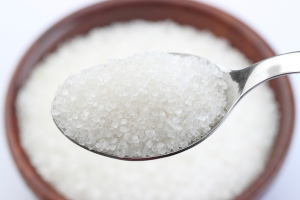Increasingly, we see reports on the negative affects of sugar. Just last month, a study published in JAMA Internal Medicine linked sugar to increased risks of heart disease.
For years, a variety of experts emphasized that high-fat diets are the strongest culprits of heart disease. Food companies quickly manufactured fat-free foods that were extremely high in sugar – think fat-free cookies, crackers and oversized bagels. This led to a fat-free epidemic, and large increases in the amount of sugar people are eating and the incidence of type 2 diabetes.
What happens when we eat foods with a lot of added sugar?
As we digest these sugars, they are quickly metabolized and tend to spike our blood sugar quickly. The pancreas then quickly releases insulin to decrease our blood sugar levels. Over time, this may lead to decreased insulin production and sensitivity, which in turn can lead to type 2 diabetes.
High levels of sugar also create inflammation in our body. When those high sugar levels hang around, they turn into fat or triglycerides, which are one part of our cholesterol or lipid (fat) profile. This is perfect storm for sticky blood vessels, and leads to increases in both our weight and risk of heart disease.
How can we decrease our sugar intake?
- Start by getting rid of soda pop. Soda pop contributes to one-third of all the sugar we intake as a nation. You might be surprised, but the average 12-ounce can of pop has nine teaspoons of sugar which on average is more than most grown men and women should have in a day.
- Keep an eye out for what might be added to your “energy drink.” Often, there is as much sugar added to energy drinks as soda pop.
- The other big culprits are candies and yogurts. The yogurt is a surprise for most of my patients. I will have many patients tell me that they have a turkey sandwich and a yogurt for lunch. Most think, that sounds alright, right? Think again, many name-brand yogurts have a large amount of added sugar. Many of the “100 calorie-light yogurts” have 26 grams of sugar! Not so healthy after all. Your bread might have a lot of added sugar, too.
- Start reading food labels. Conveniently, the FDA has moved to make it even easier to read the added sugar content in years to come with the recognition of how important decreasing our sugar content is.
- Don’t be alarmed or think that you need to stop eating fruit. Fruit has “natural sugars,” which are just fine and also has fiber that helps slow the release of sugar. It’s the added sugars that cause trouble.
On that note, I hope this helps demystify the sugar story some. If you want to learn more, check out our story on KARE 11 news or the original study from JAMA.
Stay well and go light on the added sugar!
Courtney Baechler, MD, is a practicing physician with and the vice president of the Penny George Institute for Health and Healing. She has a master’s degree in clinical epidemiology from the University of Minnesota’s School of Public Health.

 By
By